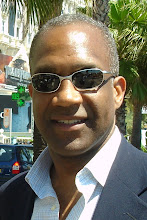 One of my least favorite popular phrases is, "Perception is reality." Nothing is farther from truth, as is definitively shown through the recent tempest surrounding the arrest of noted Harvard professor Henry Louis Gates, Jr. (pictured).
One of my least favorite popular phrases is, "Perception is reality." Nothing is farther from truth, as is definitively shown through the recent tempest surrounding the arrest of noted Harvard professor Henry Louis Gates, Jr. (pictured).As you may remember, Gates -- who is black -- was arrested by a white police officer in front of his Cambridge, Massachusetts residence for disorderly conduct. Gates, it seems, was upset with the police officer for alleged "racial profiling" in his investigation of a 911 call from one of Gates' neighbors that two men were forcing the front door of Gates' house. Gates perceived that he was being investigated because of his race. He is a black man in a predominantly white neighborhood.
The officer, a police sergeant with an exemplary service record, says that he was just doing his job in ensuring that Gates was the rightful occupant of the house as the indignant professor vociferously questioned the sergeant's motives. The sergeant says that he told Gates that he was risking arrest because of his conduct, and when the professor persisted, he was arrested.
The President, who during his election campaign noted that he had sometimes found it difficult to hail a cab in some cities because of cab drivers' perception that they are at a greater risk of being robbed by a black passenger than one who is not black, weighed in by saying that the Cambridge police had "acted stupidly" in arresting Gates, and fanned the embers back into flames.
So, today, the President will host the professor and the policeman at a picnic table at the White House and, over beers, try to redeem the situation. Which brings me back to my least favorite popular phrase.
Yes, our perceptions do frame our own peculiar realities, but that is not Reality, as in the truth.
The professor, understandably perhaps, based on his research and experience, thought that what was happening was a textbook case of discrimination based on race. It was not. Gates' neighbor saw two strange men entering a house by force and did what any good neighbor should do: Call the police.
The policeman perceived Gates as an angry, abusive citizen, perhaps not unlike many other citizens he's encountered in his law enforcement career, and he had his own textbook response for the professor's behavior: Arrest. In retrospect, perhaps the sergeant would have rather talked-down the professor in Cambridge and saved the trip to Washington, D. C. for another time.
The President perceived that the policeman had not used his best judgment by arresting Gates. Not having been there, perhaps the President's perception was the worst of the three. But that did not stop him from offering an opinion framed by his own experiences and, perhaps his personal acquaintance with Professor Gates. He apologized for his public remarks, and hopes to do a little fence-mending of his own today at the picnic table.
Is perception reality? Clearly not. Perception is perception. Reality is reality. We all use what we have and what we know to make sense of our world and the situations in which we find ourselves. But we should resist the temptation to measure others with our limited -- and often inaccurate -- yardstick.
The antidote to erroneous judgments based on limited vision (remember: to "perceive" means to "see") is humility and an even-handed approach to all situations and all people -- particularly those whom we suspect are not our champions. If we acted in such a manner, we would be amazed at how pitifully limited our perceptions are, and how magnificently broad is Reality.




No comments:
Post a Comment